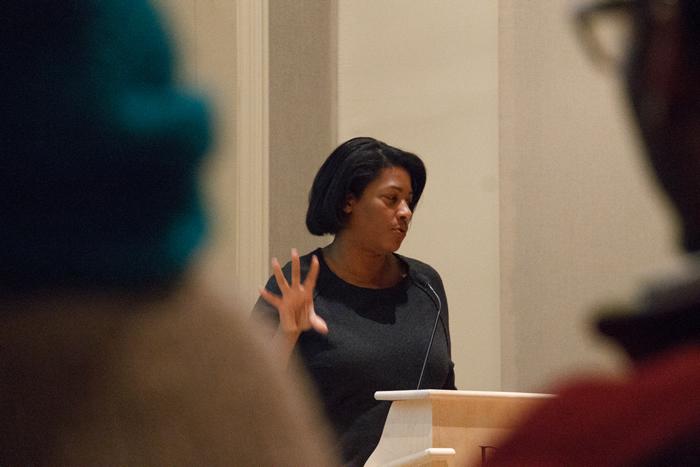Blinded by Injustice

Dawn Porter, producer of the documentary Gideon's Army, spoke to a group of students during the first part of the annual MLK Symposium.
MLK Symposium highlights racial disparities in criminal-justice system
by Celeste Hippolyte ’15
“One out of every nine young African-American men in America is incarcerated,” began Assistant Professor of Sociology Erik Love, setting the stage for an honest dialogue about mass incarceration in America and providing students and faculty with the lens to inspect what he calls an intentional racial system.
His comment was part of a community dialogue, the culminating event of this year’s MLK Symposium, hosted by the Office of Diversity Initiatives (ODI). The symposium aims to bridge the gap between contemporary social issues that affect minority groups and problems Martin Luther King Jr. addressed during his lifetime.
Paula Lima-Jones, director of ODI, chose this year’s symposium topic in response to campus buzz about civil-rights advocate and litigator Michelle Alexander’s book, The New Jim Crow, which explores the ideology of color-blindness that reinforces the U.S. criminal-justice system as a contemporary form of racial control—i.e., the new Jim Crow. The book had been assigned for several sociology classes, and interest stretched outside the classroom, leading to conversations across campus.
Beyond theory
The symposium began on Feb. 5 with a screening of the documentary Gideon's Army, followed by a talk by the documentary's producer, Dawn Porter, on Feb. 6. The community dialogue held on Feb. 12 began with a panel discussion led by Love, Associate Professor of Sociology Dan Schubert and Pre-Doctoral Fellow in American Studies Marisol LeBrón.
The panel also included J. Jondhi Harrell and Anthony Dickerson, representatives of the Philadelphia chapter of a community-based organization called Decarcerate PA that works to reduce the prison population in Pennsylvania and reinvest money into their local communities. The organization also assists returning citizens in their transition out of prison as they guide them in reinventing themselves for the sake of their families and communities.
The panelists all spoke to their connection to mass incarceration. Each professor elaborated on their research pertaining to the epidemic, while the men of Decarcerate PA spoke about the lived experience of incarceration, as they both had served time in the U.S. prison system.
“I didn’t know how violent jail was, until I got there,” said Dickerson, who spent time in Graderford Prison. He recalled having to put on a hardcore persona as a survival tactic.
“It changes your personality,” he said, “You have to have an edge in jail, or else people will consider you as weak.”
These are among the many psychological effects of the prison system. Love called it the “peculiar institution of the present,” comparing it to past “peculiar institutions” such as slavery, an establishment reinforced with legislation that underscores the purposeful intent of racism.
Double-edged swords
The community dialogue also included a question-and-answer portion. Jahmel Martin ’16 asked, “What do you say to those black and Latino prisoners who feel betrayed by police officers who share the same racial background as they do, and are the cause of them being in jail right now?”
LeBrón responded with findings from her research on the prison system in Puerto Rico, noting that Puerto Rican offenders often feel this same type of betrayal by policemen who many times are from the same villages as the men and women whom they are arresting and sending away.
“It messes with the psyche,” she said, “especially when the only jobs being offered are within the criminal-justice system.”
So what do you do when you have your own family to feed, but it comes at a cost of putting your own people in jail? This is the double-edged sword that many minority officers face. Their job demands desensitization and perpetuates the false sense of color-blindness that Alexander articulates in her book.
Connecting the dots
Harrell, the second panelist from Decarcerate PA, spent 18 years in federal prison and has since been an advocate for creating an environment of learning in prisons. He has worked side-by-side with his mentor, Mutulu Shakur, for 12 years and has campaigned for the reshaping of what it means to be a returning citizen.
“They are still citizens,” he noted, speaking to the dehumanization of offenders once released from prison.
Harrell also challenged the practice of assigning life sentences, saying that it is a demonstration of authority and is put in place to belittle prisoners. “When you give someone a life sentence, you are saying that someone’s life has no meaning,” he explained.
Attendees were stunned by the realities of the prison system painted by Harrell and Dickerson. Their stories brought to life the theoretical framework that Love, Schubert and LeBrón provided. The concept of bridging the gap between the past and present and linking ideology with the lived experience remained constant throughout the discussion and gave students the opportunity to apply their studies to the conversation.
When ODI intern Frank Williams’15 was asked about connecting the dots between the past and present, he noted, “That’s the goal of the symposium. This happened, this is happening; now let’s take a look at the similarities and look at how we can address this problem, the same way our predecessors did.”
Published February 21, 2014